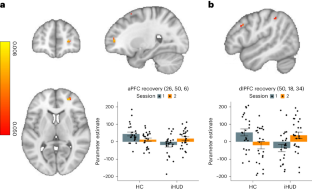Using task-based functional MRI, we examined inpatients with heroin use disorder. We found that 15 weeks of medication-assisted treatment (including supplemental group therapy) improved impaired anterior and dorsolateral prefrontal cortex function during an inhibitory control task. Inhibitory control, a core deficit in drug addiction, may be amenable to targeted prefrontal cortex interventions.

References
Center for Disease Control. Drug overdose deaths in the U.S. top 100,000 annually https://www.cdc.gov/nchs/pressroom/nchs_press_releases/2021/20211117.htm (2021). A press release that summarizes substance-use-related overdose death statistics.
Goldstein, R. Z. & Volkow, N. D. Drug addiction and its underlying neurobiological basis: neuroimaging evidence for the involvement of the frontal cortex. Am. J. Psychiatry 159, 1642–1652 (2002). A review article that presents core symptoms in drug addiction that are associated with PFC impairments, including excessive salience attributed to drug cues at the expense of nondrug cues and rewards with concomitant decreases in inhibitory control.
Ceceli, A. O., King, S., McClain, N., Alia-Klein, N. & Goldstein, R. Z. The neural signature of impaired inhibitory control in individuals with heroin use disorder. J. Neurosci. 43, 173–182 (2022). An empirical report in which we found worse behavioral performance and PFC hypoactivation during inhibitory control in inpatients with heroin use disorder.
Garland, E. L., Atchley, R. M., Hanley, A. W., Zubieta, J.-K. & Froeliger, B. Mindfulness-Oriented Recovery Enhancement remediates hedonic dysregulation in opioid users: neural and affective evidence of target engagement. Sci. Adv. 5, eaax1569 (2019). A study that provides neurophysiological evidence for the efficacy of Mindfulness Oriented Recovery Enhancement — one of the therapy groups that supplemented inpatient treatment in our study, with results pending trial completion — in restructuring impaired incentive salience in patients with chronic pain who misuse opiates.
Additional information
Publisher’s note Springer Nature remains neutral with regard to jurisdictional claims in published maps and institutional affiliations.
This is a summary of: Ceceli, A. O. et al. Recovery of anterior prefrontal cortex inhibitory control after 15 weeks of inpatient treatment in heroin use disorder. Nat. Ment. Health https://doi.org/10.1038/s44220-024-00230-4 (2024).
Rights and permissions
About this article
Cite this article
Prefrontal cortex activity increases after inpatient treatment for heroin addiction. Nat. Mental Health (2024). https://doi.org/10.1038/s44220-024-00239-9
Published:
DOI: https://doi.org/10.1038/s44220-024-00239-9
- Springer Nature America, Inc.


